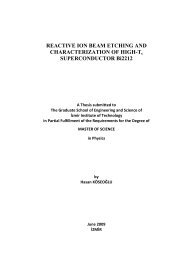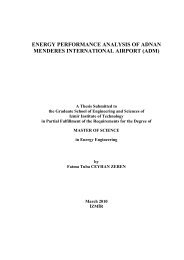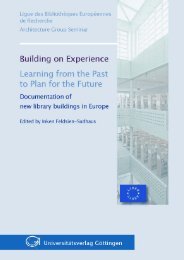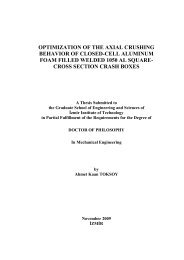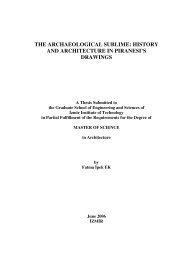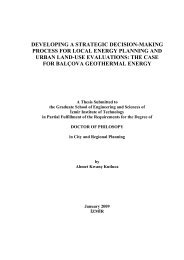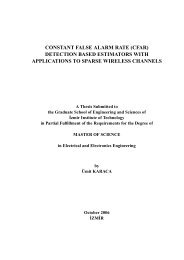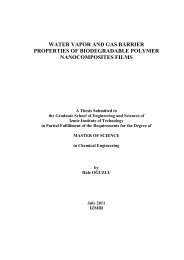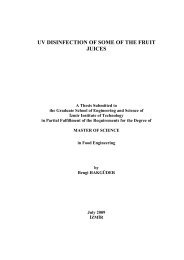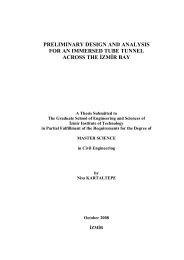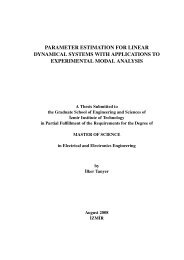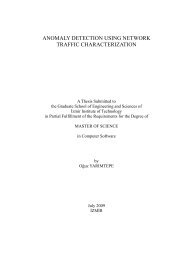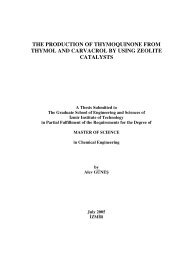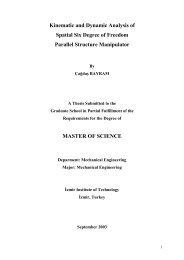a critical evaluation on the concept of justice in planning process
a critical evaluation on the concept of justice in planning process
a critical evaluation on the concept of justice in planning process
You also want an ePaper? Increase the reach of your titles
YUMPU automatically turns print PDFs into web optimized ePapers that Google loves.
different groups affected by <strong>the</strong> decisi<strong>on</strong>? These <strong>process</strong>es are guidel<strong>in</strong>es <strong>in</strong> try<strong>in</strong>g to<br />
understand and rearrange <strong>the</strong> c<strong>on</strong>cepts <strong>of</strong> equality, <strong>in</strong>terest, freedom and right as<br />
comp<strong>on</strong>ents <strong>of</strong> <strong>justice</strong>. Under <strong>the</strong>se <str<strong>on</strong>g>evaluati<strong>on</strong></str<strong>on</strong>g>s and questi<strong>on</strong>s it will be possible to<br />
evaluate whe<strong>the</strong>r a decisi<strong>on</strong> <strong>on</strong> urban land is just and what k<strong>in</strong>d <strong>of</strong> <strong>justice</strong> def<strong>in</strong>iti<strong>on</strong> is<br />
brought up. In <strong>the</strong> <str<strong>on</strong>g>evaluati<strong>on</strong></str<strong>on</strong>g> d<strong>on</strong>e by each side <strong>in</strong> <strong>the</strong> cases dur<strong>in</strong>g adjudicati<strong>on</strong> <strong>the</strong><br />
existence <strong>of</strong> <strong>justice</strong> argument could <strong>on</strong>ly be possible by <strong>the</strong>se questi<strong>on</strong>s.<br />
Important results that will guide <strong>the</strong> practical <strong>process</strong>es <strong>in</strong> <strong>the</strong> surveys d<strong>on</strong>e <strong>on</strong><br />
<strong>the</strong> sample area about adjudicati<strong>on</strong> are:<br />
It is seen that <strong>the</strong>re is no <strong>on</strong>e def<strong>in</strong>iti<strong>on</strong> <strong>of</strong> <strong>justice</strong> from <strong>the</strong> viewpo<strong>in</strong>t <strong>of</strong> sides<br />
and parties which are pla<strong>in</strong>tiffs, defendants, expert committee and dur<strong>in</strong>g adjudicati<strong>on</strong><br />
period. The approaches and def<strong>in</strong>iti<strong>on</strong>s <strong>of</strong> property owners are that <strong>the</strong>y accept <strong>justice</strong> as<br />
hav<strong>in</strong>g <strong>the</strong> maximum build<strong>in</strong>g right <strong>on</strong> <strong>the</strong>ir own properties. So, <strong>the</strong> dom<strong>in</strong>ant viewpo<strong>in</strong>t<br />
is that <strong>the</strong>y should have <strong>the</strong> same opportunity to have <strong>the</strong> same urban pr<strong>of</strong>its like o<strong>the</strong>r<br />
property owners <strong>in</strong> <strong>the</strong> city. It is acceptable that <strong>the</strong>se demands base <strong>on</strong> a rightful<br />
thought s<strong>in</strong>ce this area has an important urban pr<strong>of</strong>it and usage rights are limited highly.<br />
However, cases about protect<strong>in</strong>g <strong>the</strong> rights <strong>of</strong> urban populati<strong>on</strong> are very small <strong>in</strong><br />
number, which were opened by <strong>the</strong> citizens who are not property owners and who<br />
c<strong>on</strong>tribute to <strong>the</strong> formati<strong>on</strong> <strong>of</strong> urban pr<strong>of</strong>it <strong>on</strong> that area. In this sense, it is seen that while<br />
<strong>in</strong>dividual property owner rights are carried to a legal platform no arguments are d<strong>on</strong>e<br />
about citizen rights. This <strong>process</strong> represents that <strong>the</strong> rights <strong>of</strong> urban populati<strong>on</strong> are not<br />
def<strong>in</strong>ed clearly and that <strong>the</strong>re are many <strong>in</strong>sufficiencies about <strong>the</strong> organizati<strong>on</strong>s about<br />
limitati<strong>on</strong>s <strong>on</strong> urban plots, property market. In <strong>the</strong> claims <strong>of</strong> decisi<strong>on</strong> mak<strong>in</strong>g<br />
<strong>in</strong>stituti<strong>on</strong>s and practic<strong>in</strong>g units which are defendant parties, <strong>on</strong> <strong>the</strong> o<strong>the</strong>r hand, it is<br />
stated that <strong>the</strong> public <strong>in</strong>stituti<strong>on</strong> about “<strong>justice</strong>”, c<strong>on</strong>siders <strong>the</strong> public <strong>in</strong>terest <strong>in</strong> all its<br />
decisi<strong>on</strong>s. Therefore it can be claimed that <strong>the</strong> decisi<strong>on</strong>s are “just” <strong>in</strong> that sense. From<br />
this viewpo<strong>in</strong>t it can be c<strong>on</strong>cluded that <strong>the</strong> <strong>in</strong>stituti<strong>on</strong> is neutral/impartial and<br />
<strong>in</strong>dependent, has equal distance to all social groups and acts homogenously to all social<br />
groups, which is impossible. It is <strong>in</strong>def<strong>in</strong>ite what k<strong>in</strong>d <strong>of</strong> a “public <strong>in</strong>terest” and “just”<br />
relati<strong>on</strong> <strong>process</strong> take place <strong>in</strong> <strong>the</strong> plan changes about <strong>in</strong>creas<strong>in</strong>g <strong>the</strong> density <strong>on</strong> plot<br />
bases, <strong>on</strong> <strong>the</strong> survey area. In <strong>the</strong> <str<strong>on</strong>g>evaluati<strong>on</strong></str<strong>on</strong>g> <strong>of</strong> expert committee, it is seen that although<br />
an <str<strong>on</strong>g>evaluati<strong>on</strong></str<strong>on</strong>g> bas<strong>in</strong>g <strong>on</strong> plann<strong>in</strong>g discipl<strong>in</strong>e and plann<strong>in</strong>g pr<strong>in</strong>ciples take place, no clear<br />
explanati<strong>on</strong> was given about whatever will provide <strong>the</strong>se pr<strong>in</strong>ciples to be “just”. The<br />
expert committee which especially forms <strong>of</strong> three people <strong>in</strong> adm<strong>in</strong>istrative court<br />
sometimes did not have <strong>the</strong> same op<strong>in</strong>i<strong>on</strong>. In this sense <strong>the</strong>se people who have <strong>the</strong> same<br />
194



